Discover top software picks to streamline your small business and boost profits. Find the best tools for maximum efficiency and financial control in our guide
Key takeaways
- Match software complexity to your needs: simple tools like FreshBooks suit solopreneurs while comprehensive options like Sage fit growing teams.
- Free plans from Asana, Trello, and Slack let small businesses test project management and communication tools before committing.
- Prioritize integration capabilities when choosing software to ensure your accounting, project management, and communication tools work together seamlessly.
Running a business - no matter how small - is a lot of work. Whether it's client meetings, stock control or handling business finances, there’s so much to keep on top of.
No matter what type of business you run, streamlining is crucial to keeping things organized and running smoothly. It doesn't matter if you're a solo business owner wearing every possible hat or a if have a small team behind you, finding the right software is key.
In this article, we'll break down some of the best tools and software for small businesses, covering accounting software, project management, communication tools and much more.
Read on to discover the best options for your business.
The best software for small businesses
Best accounting software for small businesses
🥇 Sage

If you're looking for an all-in-one accounting software, Sage definitely delivers several features. Whether you're managing your accounts yourself, or looking to give an accountant access, Sage makes it easy.
When it comes to small business accounting software, Sage's capabilities cover all bases, giving owners streamlined financial management. This includes the typical features you'd expect of online accounting software, such as:
- Trackable personalized invoices, with the ability to send reminders
- VAT returns for VAT-registered businesses
- Data entry automation to make purchase invoices and receipts easy
- Visual view of your cash flow on Sage's dashboard
- Detailed financial reports
Pros of Sage
- Built-in error checks — Sage works to stop any discrepancies in their tracks
- Connects right to your bank — This provides an instant overview of your small business income and expense tracking
- Organization — With your financial data organized logically, everything is easy to find so you can see key financial information quickly
- Time-saving potential — With more tasks automated, you'll save time and stress with financial processes handled for you
Cons of Sage
- Initial setup can be confusing, especially for those new to small business accounting software or even switching from other accounting software providers
- Sage's interface is user-friendly, but a little more complex than very simple accounting software, which may feel overwhelming for new users
- The subscription cost can quickly rise, which may be out of reach for very new small business owners
Pricing
- Accounting Start: $19/month
- Accounting Standard: $43/month
- Accounting Plus: $62
🥈FreshBooks
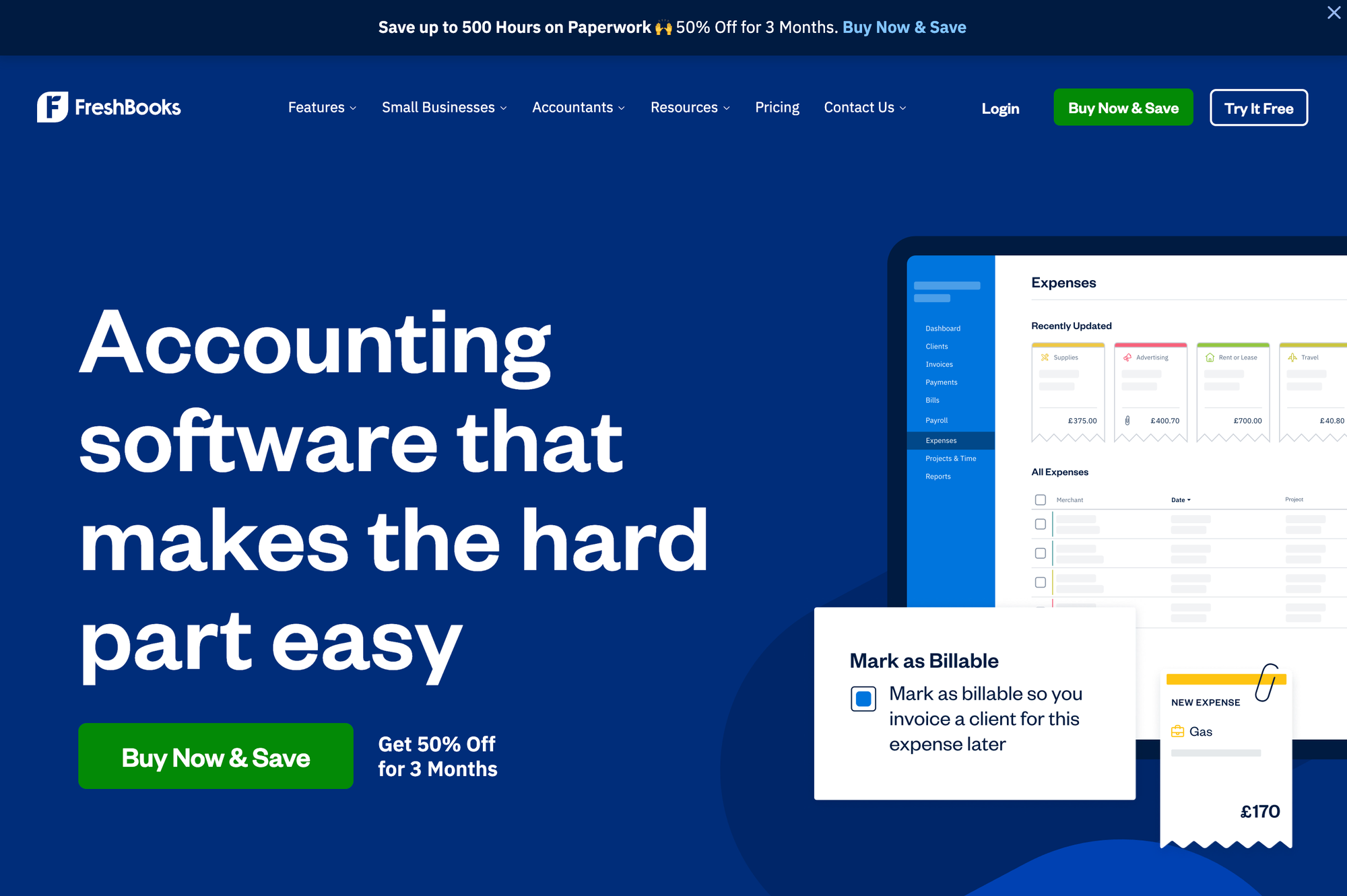
FreshBooks might seem simple on the surface, but it's actually packed with features small business owners can take advantage of.
If you're a solo entrepreneur or a small business with a couple of employees, FreshBooks can fully handle your needs — and much more.
The platform is great for handling your invoices, automatically adding tracked time and expense tracking. Plus, with the option to set up recurring invoices and send late payment reminders, you can spend less time chasing and more time running your business.
Here's a peek at some of FreshBooks' features:
- Expense tracking with easy mobile receipt scanning and bank account imports
- Financial reports with easy access for your accountant
- Create branded proposals and estimates to streamline billing
- Mobile app puts your accounting software in your pocket for on-the-go updates
Pros of FreshBooks
- Simple to use — FreshBooks makes accounting software straightforward
- Time tracking capabilities — Unlike other accounting software providers, FreshBooks includes time tracking on all their plans
- Mobile app — Receive instant notifications when invoices have been paid or are overdue with their mobile app
- Phone support — 8 a.m. to 7 p.m. Eastern time support Monday to Friday
Cons of FreshBooks
- Extra cost for team members
- Inventory management isn't the best
- Lite plan lacks bank reconciliation tools and accountant access
- Accountants can't access full audit trail, no matter which plan you opt for
Pricing
- Lite: $9.50/month
- Plus: $16.50/month
- Premium: $30.00/month
- Select: Contact for pricing
🥉QuickBooks Online
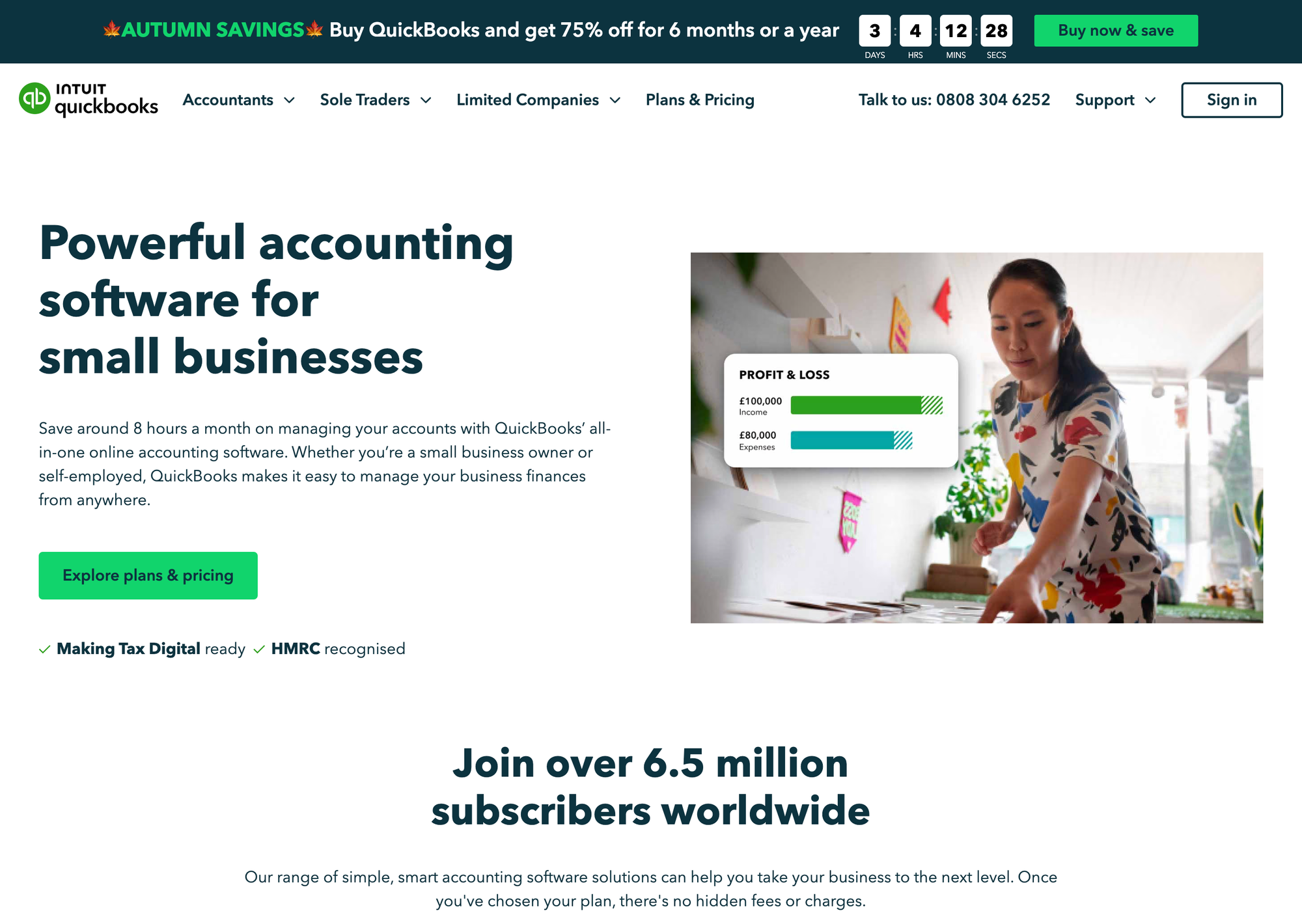
A comprehensive platform for maxing tax digital, tracking expenses, invoicing and even inventory management — QuickBooks is an impressive accounting software option.
Although it's a little expensive at a starting cost of $35 per month, this cloud-based software is another strong option if you’re a business owner.
Some QuickBooks features:
- Custom invoices, sales receipts and estimates
- Record expenses, track sales tax and payroll tax
- Connect straight to your bank account and categorize transactions
- Inventory management tools
Pros of QuickBooks Online
- Widely used — QuickBooks is well-known, so if you need to bring a bookkeeper on board, they'll likely already be aware of how to use it
- Easy tracking — QuickBooks makes it easy to link and track your finances, all in one place
- Easy payroll features — Although it is a paid add-on, QuickBooks' payroll tools make it easy to organize paying your employees
Cons of QuickBooks Online
- Setting up with QuickBooks Online can be a bit of a learning curve, especially as you work to customize it to your preferences initially
- Not the most affordable accounting software solution
- Very limited support if you get stuck
Pricing
- Simple Start: $35/month
- Essentials: $65/month
- Plus: $99/month
- Advanced: $235/month
Best project management software for small businesses
🥇Asana

With more than 100 plug-in apps and services available, Asana is an affordable project management tool for budding businesses. The interface itself is user-friendly and easy to navigate, even if you haven't used this type of tool before.
Asana is pretty accessible, with a free plan available and Starter plan being just $13.49 per month — both of which have some impressive features. The software also integrates well with other popular products and services, including Slack, Dropbox and Salesforce.
If you struggle to keep on top of your projects, tasks and track time, Asana could slot seamlessly into your business. For service based businesses, Asana can be incredibly helpful if you need to bill by time spent — especially if you work closely with freelancers or other businesses.
Pros of Asana
- Easy to use — Asana's user interface provides a great user experience, making the platform very intuitive
- Collaboration focused — The whole intention of Asana is to promote collaboration as a project management tool, allowing you to invite others to your workspace to collaborate easily
- Efficient task management — Asana provides an easy overview of tasks, allowing you to prioritize and stay on track
Cons of Asana
- Time tracking on their free plan requires paid integrations
- The many features associated with tasks can make the platform a little overwhelming
- Only one user can be assigned to a task, which isn't great for a collaboration tool
Pricing
- Free
- Starter: $13.49/month
- Advanced: $30.49/month
Their free plan is rich with features, including:
- The ability to collaborate with up to 10 team members
- Unlimited tasks
- Unlimited projects
- Unlimited messages
- Calendar view
- iOS and Android apps
- Time tracking with integrations
- 100+ free integrations
🥈Trello
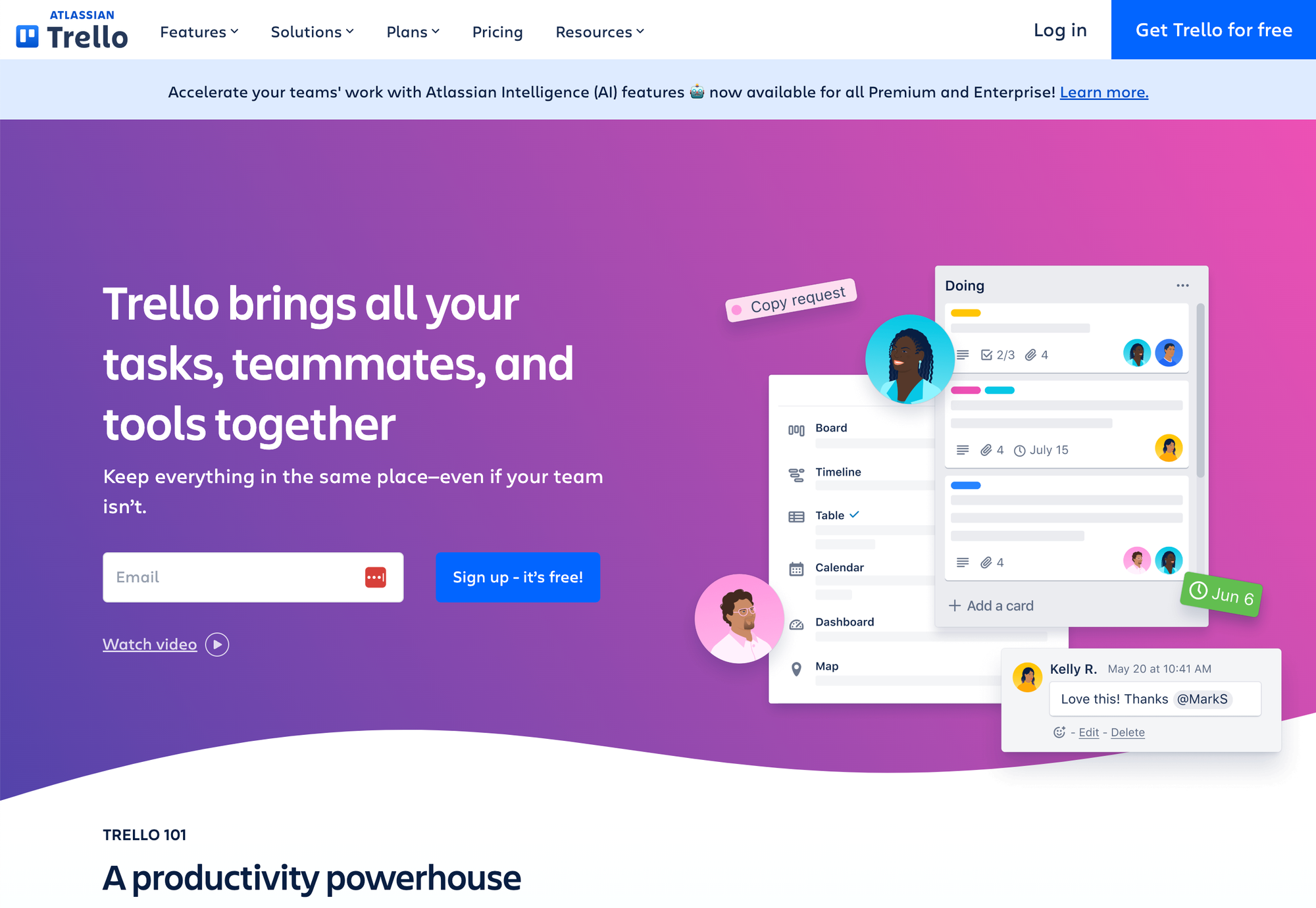
If you prefer a more visual way of working, Trello is a competitive contender with a drag-and-drop interface.
Using a Kanban style of working, Trello is incredibly intuitive with some great automation features. Their free plan is perfect for individuals just getting started, and for small businesses it's still affordable at $5/user/month on their Standard plan.
Here's some great perks of Trello:
- Unlimited cards (tasks)
- Unlimited lists
- File attachments on task cards
- Integrate your team's favorite tools with Trello plugins
Pros of Trello
- Easy to use templates — Trello makes it easy to get started and setup, with simple but powerful templates
- Impactful integrations — Trello's 'power-ups' make it easy to link tools with Trello plugins
- Smooth automations — Streamline your work by automating tasks and workflows
Cons of Trello
- Limited advanced features, such as built-in reporting tools
- Scalability issues for small businesses, as its simplicity may hinder expansion
- Limited customization options
- Limited offline functionality as it is a primarily web-based tool
Pricing
- Free
- Standard: $5/user/month
- Premium: $10/user/month
- Enterprise: $17.50/user/month
🥉Wrike
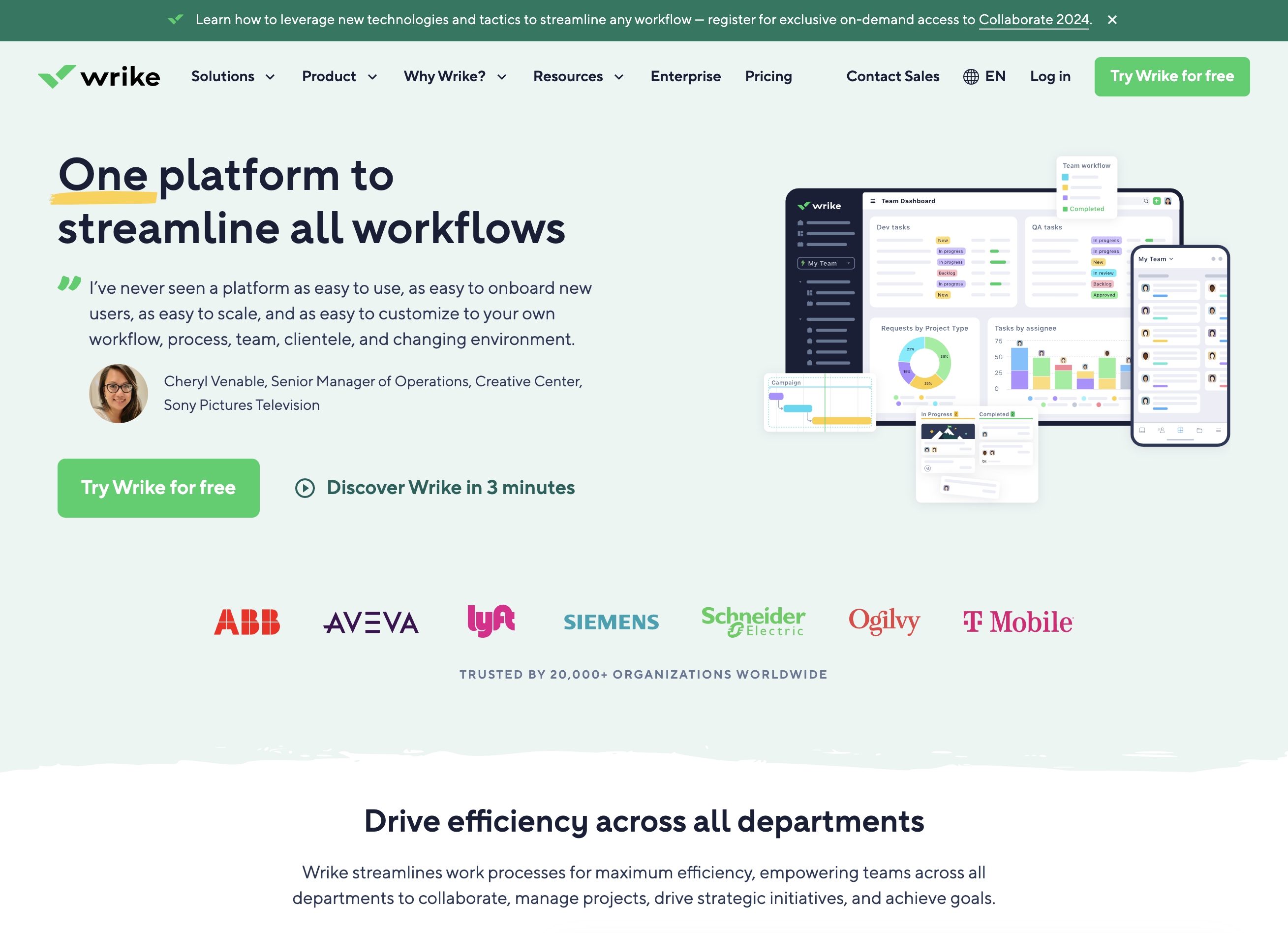
If you love nothing more than getting stuck into a spreadsheet, you're going to love Wrike.
This project management software works perfectly for solo business owners and small businesses — especially if you're spreadsheet-focused. With flexible, free-form task details and easy email integration, Wrike brings together spreadsheet functionality and some more advanced features.
There are some other perks too:
- Wrike's email integration allows you to do more than send a simple message — you can create a task, assign one, add attachments and even add a task to a subfolder all via email
- Flexible project templates which can be replicated for future similar projects, saving time
- Incredibly easy to use task management, so you can stay on track with your work easily
- Impressive Gantt chart helps you to see a project's progress instantly
Wrike Pros
- Centralize your work in one place — Wrike becomes your single-source for all your work, with powerful, customizable workspaces
- Time-saving automation — Save precious time on routine tasks by setting up automation, including request forms and approvals
- Real-time data — See what's going on instantly in your dashboard, so you can stay in control
Wrike Cons
- Can get a little expensive as you pay per user
- Wrike lacks a note-taking tool
- Its default filter is unchangeable, which requires users to manually change the tiler to include completed tasks which some users might find annoying
Pricing
- Free
- Team: $10/user/month
- Business: $24.80/user/month
- Enterprise: Contact for pricing
- Pinnacle: Contact for pricing
Best communication tool for small and growing businesses
🥇Slack
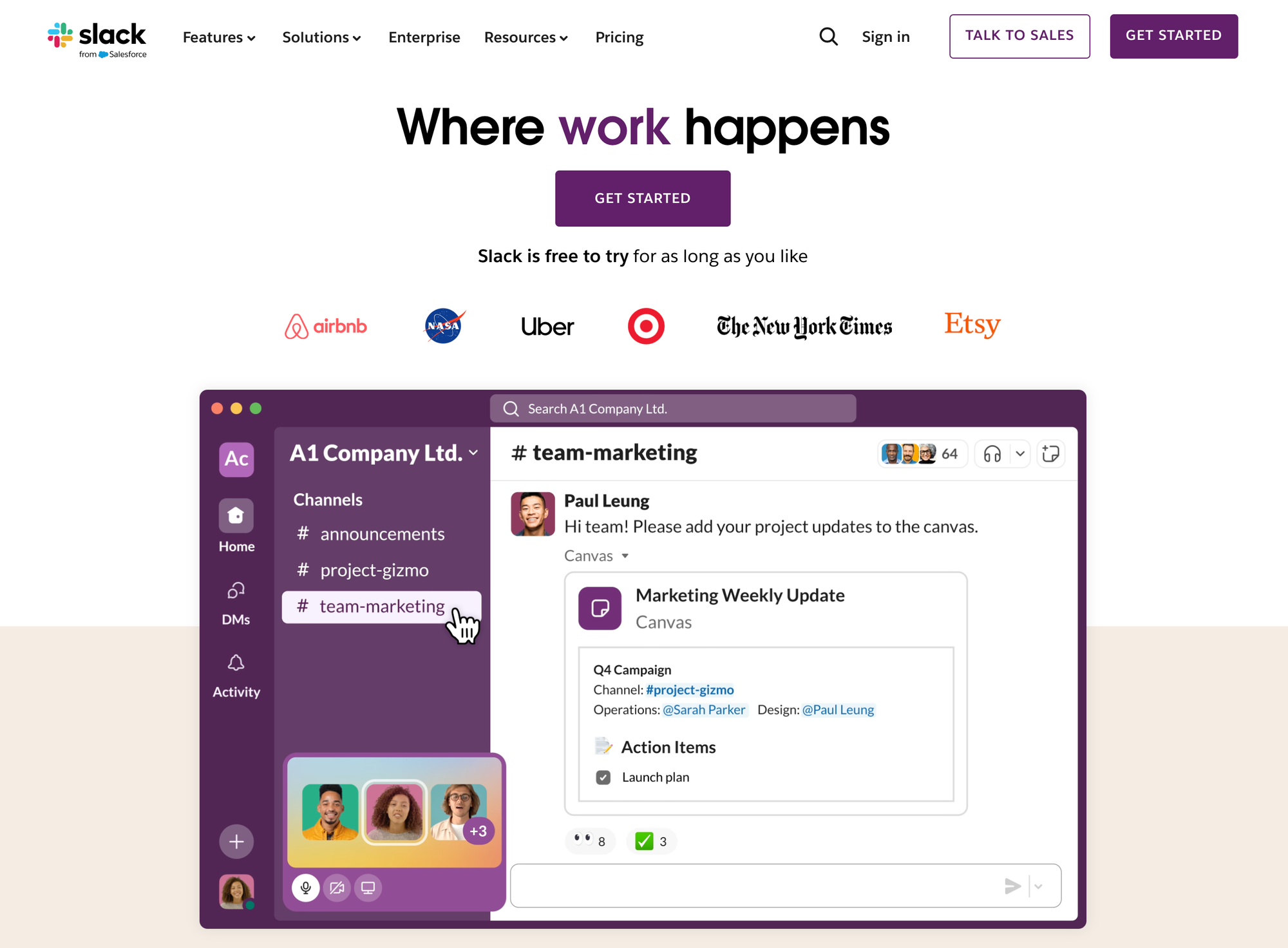
With thousands of integrations to other software, Slack makes it easy for teams to collaborate and stay connected. Slack's interface makes it simple to get setup right away — organizing chats into 'channels' so you can keep things organized.
The free plan offers a bunch of features, but it can get a little pricey as you add more users on the paid subscriptions. The biggest benefit of Slack is certainly how intuitive the platform is, making it straightforward to chat with your team (including both internal and external contributors), have a group discussion or have a call.
If you prefer audio over text, Slack's 'huddles' is a form of always-on audio channel to speak directly and collaborate with team members.
Pros of Slack
- Slack works with over 2,600 tools, making it perfect for streamlining work
- The platform neatly arranges chats into channels, for easy organization
- Slack's flexibility with apps and bots works to improve processes and save time
Cons of Slack
- Frequent alerts/notifications may be distracting for team members, however, customization is possible to maintain control over these
- Although Slack is easy to use, it can be a bit of a learning curve initially to get familiar with working in channels
Pricing
- Free
- Pro: $8.75/user/month
- Business+: $15/user/month
- Enterprise Grid: Contact for pricing
🥈Discord

Originally built as a gaming tool, Discord may not always be seen as a go-to communication platform. But more recently it has been marketed to online communities, making it particularly helpful for remote co-working and small teams.
Much like Slack, Discord also organizes your chats into channels to keep things organized.
Pros of Discord
- Always-on audio channels — Speak directly to colleagues with Discord's voice channels, for easy collaboration
- Easy to use — Getting setup is quick and simple, and the platform itself is really easy to use and navigate
- Fun gaming style — Discord adds an extra layer to your ordinary communication tool, making it more interactive and fun than your typical work chat
Cons of Discord
- File uploads are limited to 25MB in the free version
- The gaming style might not be for everyone
Pricing
- Free
- Nitro Basic: $4.99/month
- Nitro: $9.99/month
🥉Chanty
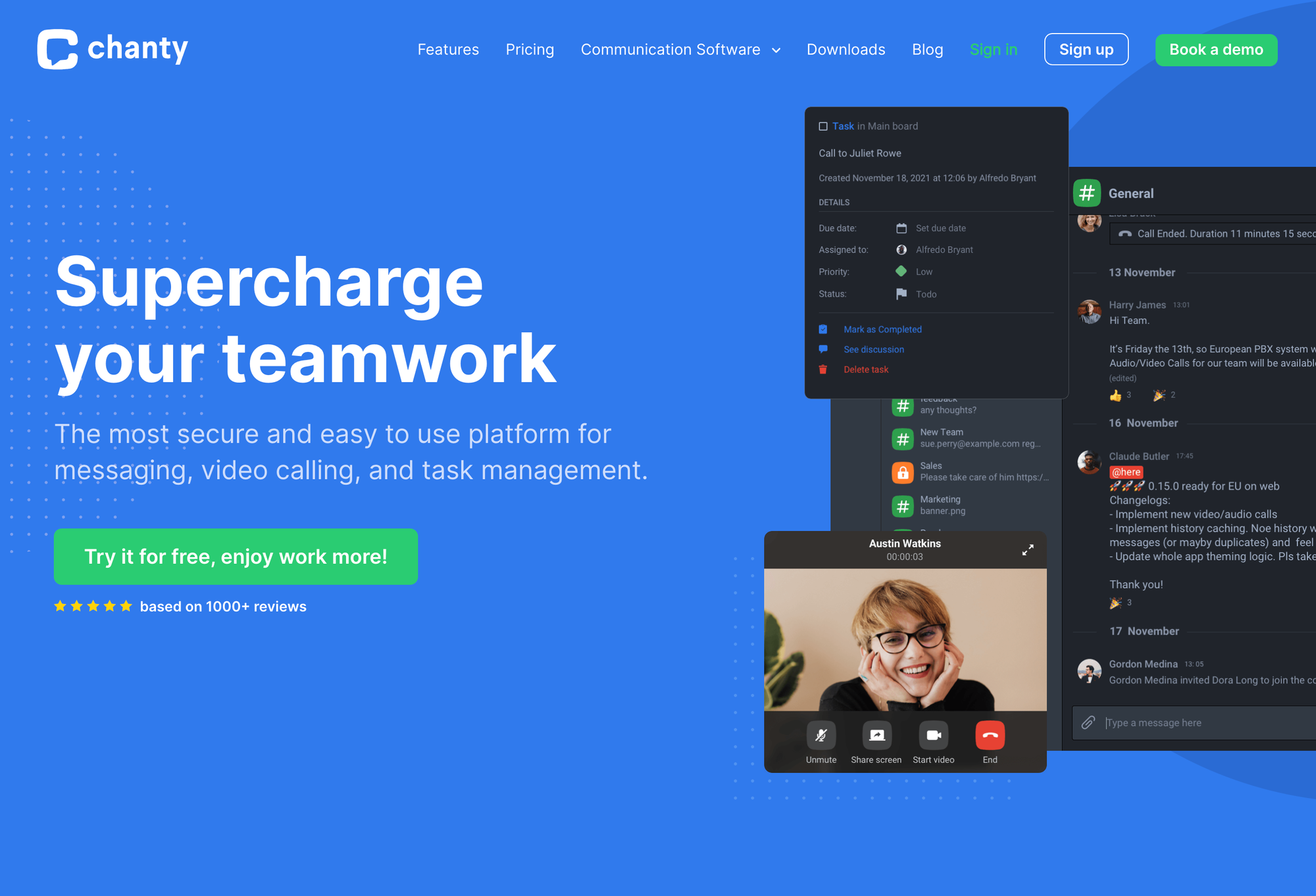
Available on Mac, Windows, Android and iOS, Chanty is a simple team chat tool fit for small businesses.
Similarly to Slack, Chanty allows you to create both public and private channels, as well as direct messaging for private conversations. It also helps to organize your files, links and tasks into folders, called Teambook.
Here are a few other features worth mentioning:
- Save your ideas with the help of pins, so you can always find what you're looking for
- Code snippets with dev-friendly formatting
- View your favorite content in Chanty, including YouTube, GIFs and other social media content
- Easily optimize your workflow with Kanban board view
Pros of Chanty
- Easily connect with apps including Zapier, for even more functionality
- Cost effective, providing an effective tool without breaking the bank
- Easy to use with free form search to easily find previous threads quickly
Cons of Chanty
- Limited integration options
- Some users have reported issues with screen sharing and notification settings
Pricing
- Free
- Business: $4/user/month
Looking to build a community? We put Discord and Slack head-to-head — see who comes out top in our comparison.
Best CRM software for small businesses
🥇Whop

Okay, we might be biased, but Whop's CRM tools go above and beyond your typical small business software. Whether you're selling digital downloads such as courses or ebooks, or building a private online community —Whop can handle it all.
Stay in touch with your customers easily, while promoting new products and managing your existing — all from your Whop dashboard.
One of the greatest things about the platform is your instant access to a growing community of buyers. So when you're ready to sell, they're ready to buy.
Here’s what you’ll get straight out of the box when you sign up to Whop.
- All-in-one platform delivers everything you need
- Community management, all from one place
- Integration with third-party apps and tools
- Payment processing with only a 2.7% + $0.30 transaction fee
Pros of Whop
- Getting started takes less than 10 minutes, so you can be selling in no time
- Manage your business from one place, from taking payments to customer support
- Start with an audience right away, with Whop's huge community of buyers
Cons of Whop
- You might not have heard of us before, but what are you waiting for? 😎
Pricing
- As low as a 2.7% + $0.30 transaction fee when you make a sale
🥈HubSpot
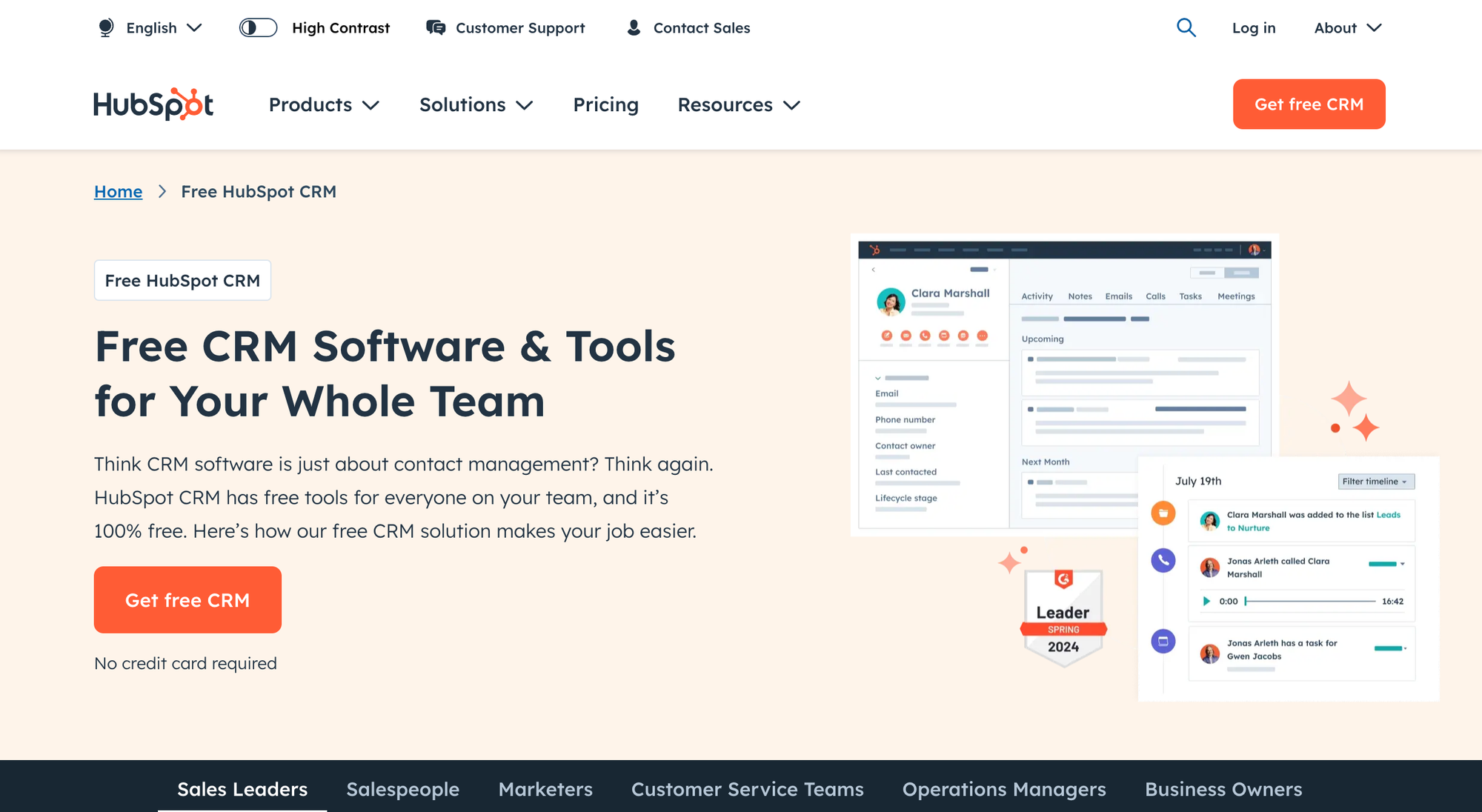
HubSpot helps to connect your data, customers and team all in one place. This means you can ramp up your marketing efforts, maximize your sales and keep your customers in the loop all from one platform.
With tools for lead generation and email marketing, you can work to grow your mailing list and nurture leads without having to switch platforms. Everything you need is easy to fill out, such as their job title, website and other important information.
Some great free features include:
- Meeting scheduler
- Email template builder
- Live chat software
- AI email writer
Pros of Hubspot
- Easy to use email marketing — Nurturing leads and generating sales is key for any small business, so be sure to take full advantage of their email marketing tools
- Optimize customer experience — With features such as ticketing and live chat, your customers will always receive next-level communication
- Save money — With HubSpot providing a central space for customer management, lead generation and even social media interactions, you can save money on using multiple tools
Cons of Hubspot
- If you do require more advanced features, you will need to choose a paid plan which could get expensive for small businesses
- There are some limitations in its email tool, including signature customization capabilities
- Limited reporting options unless you're on a paid plan
- You have to pay for additional technical support if needed
Pricing
- Free
- Starter Customer Platform: $20/month
🥉Monday CRM
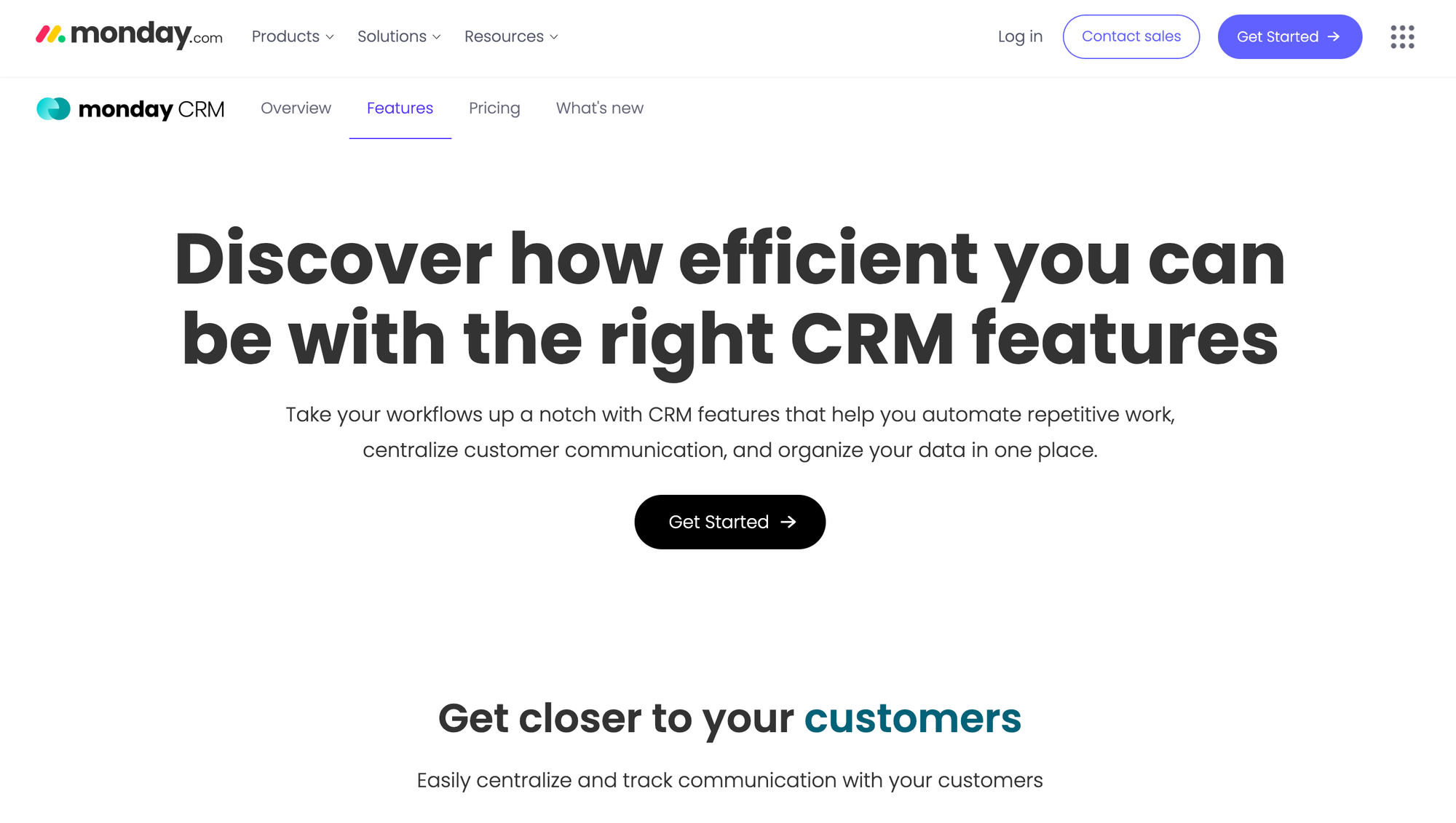
As a small business, your time really is money. Finding a suitable CRM for a small business can make a huge difference to your processes and organization.
Whether your focus is to simplify and automate repetitive work or create a central hub for customer communication, a tool such as Monday CRM could tick all the boxes.
Here are some of the features worth highlighting:
- Unlimited customizable pipelines
- Unlimited boards and contacts
- Templates for lead, contact and deal management
- Funnel chart
- AI email generator
- iOS and Android apps
Pros of Monday CRM
- Growth potential — With unlimited contacts and great email tracking and automation, Monday CRM has plenty of space for growing businesses to blossom
- Unlimited boards — Organize your projects, clients and processes with unlimited boards so you know exactly where you're spending time
- Custom CRM automation — See the magic happen and create your own custom CRM automations (Standard plan+) to keep everything running smoothly
Cons of Monday CRM
- Quite expensive for small businesses
- Can be difficult to get setup initially and tweak according to your needs
- Some elements have limitations, which may be frustrating for some users
Pricing
- Basic CRM (3 seats): $50/month
- Standard CRM (3 seats): $70/month
- Pro CRM (3 seats): $120/month
- Enterprise: Contact for pricing
Best small business software for antivirus
🥇 Avast Business Antivirus
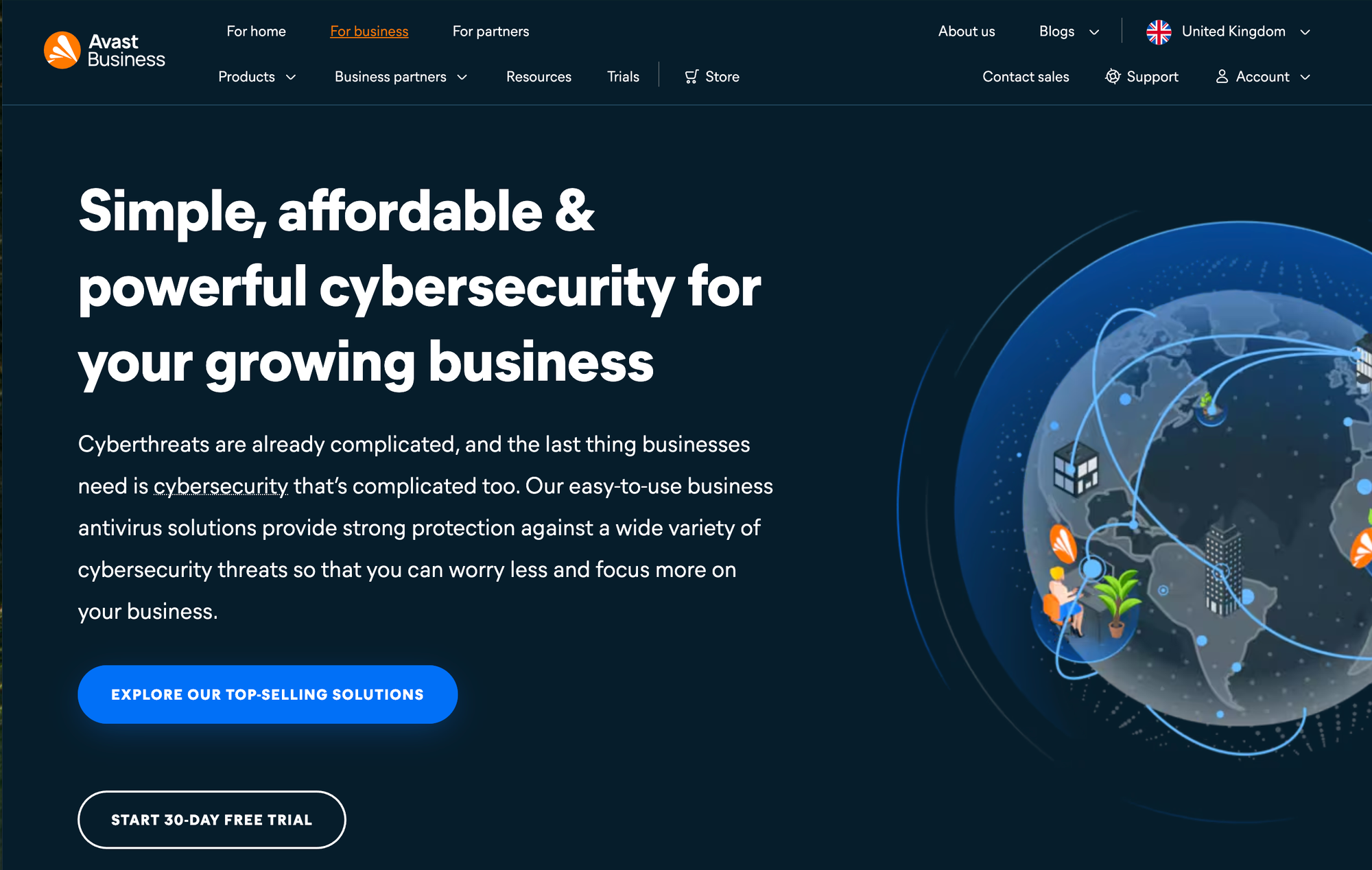
No matter the size of your business, Avast Business Antivirus can provide complete protection for your business. With opportunities to grow with you, Avast covers anywhere between one to 100+ devices.
Avast provides a wide range of helpful features for any small business, keeping your technology safe from threats, phishing and more.
Here are some of Avast's key features:
- Online management platform
- Ransomware and data protection tools
- Personal VPN
- USB Protection
- Patch management
Pros of Avast Business Antivirus
- 30 day free trial — Try before you buy
- VPN and file shredder — Keep your computer clutter-free and safe while on public WiFi
- Phishing protection — Help keep your small business information safe, protecting you from fake sites that may try to steal data
Cons of Avast Business Antivirus
- Personal VPN not available for macOS
- Patch management not available for macOS
- Finding the right payment tier to cover all of your devices can get confusing and expensive
Pricing
- Essential Business Security: $31.37/per device/per year
- Premium Business Security: $39.85/per device/per year
- Ultimate Business Security: $48.33/per device/per year
🥈TotalAV

Although not every small business runs on Mac, for those that do, TotalAV offers plenty of features at a very affordable price point. TotalAV is also available for Windows computers, however, much of its content and optimization tools seem to be focused towards Mac.
Not only can this tool protect your computer from malware, adware and ransomware but it also works to optimize your device too.
If you find your computer running a little slow, TotalAV can help free up system space and optimize your system. Here are some other features worth noting:
- Up to 6 device protection on their Total Security plan
- iOS and Android protection
- Safe browsing VPN
- Ad blocker
- Secure password vault
Pros of TotalAV
- Mac cleaner and optimization tools — Keep your Mac clutter free and running fast with TotalAV's optimization tools
- Value for money — For any small business, saving money is crucial — TotalAV offers affordable pricing and a lot of features for the price
- Cookie and history management — Take control of your data and manage your browser cookies and history easily
Cons of TotalAV
- Promotional pricing might tempt you in, with increased costs upon renewal
Pricing
- TotalAV Antivirus Pro: $99/annually
- TotalAV Internet Security: $129/annually
- TotalAV Total Security: $149/annually
🥉 Webroot
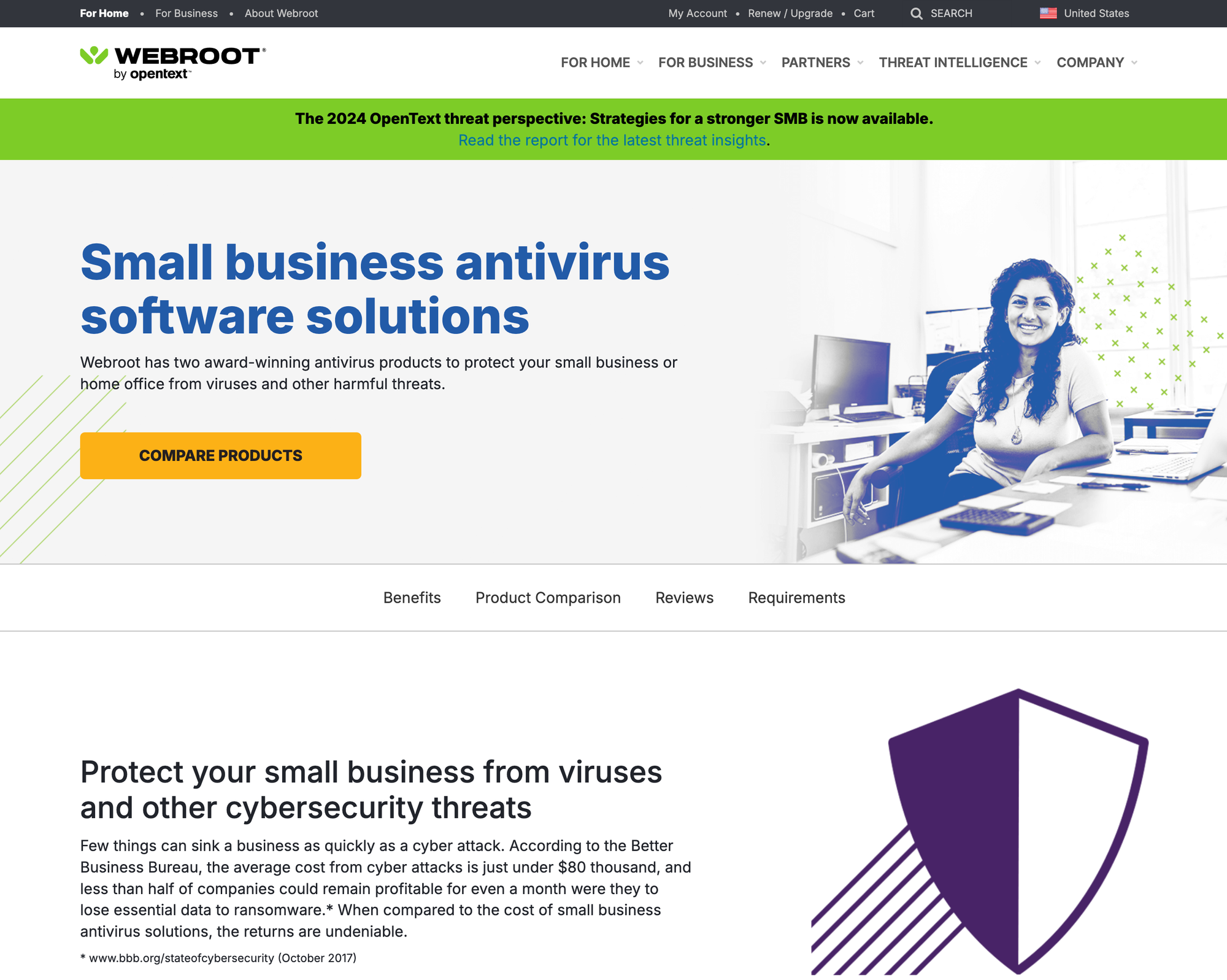
If you're a small business looking for lightweight antivirus software services, Webroot is a great contender. With two scanning options (Deep Scan/Quick Scan), it's easy to keep on top of your computer's safety.
Webroot offers a file shredder built-in for clearing out computer clutter, as well as easy-to-use apps and LastPass manager included.
Here are some of Webroot's features:
- The ability to customize the scanning settings to enable unwanted program detection and more
- Webroot's Realtime Shield offers real-time protection and continuously monitors activity
- Identity Protection works to safeguard your accounts and usernames
Pros of Webroot
- Light on system resources — Keep your computer running fast while conducting a scan
- Beginner friendly — Webroot will protect your small business right out the box
- Purpose built — Webroot's Business Endpoint Protection was purpose built to protect SMBs and MSPs
Cons of Webroot
- The interface looks a little outdated compared to others
- Can start to get expensive as you add more devices
- In tests, the tool's firewall feature isn't quite as robust compared to others
Pricing
- Webroot Business Endpoint Protection: $36/1 device/1 year
Best creativity and design software for small businesses
🥇 Canva

If you're looking to create consistency across your small business, Canva is easily one of the best software options for growing brands.
Since the tool is so dynamic, you have the opportunity to take advantage of a wide range of features, graphics and more to create social media marketing templates, business cards and everything in-between. Canva also makes it easy to organize your designs into folders, collaborate with others and invite users to comment on your designs.
Here are some of Canva's features:
- Photo editing
- Video editing
- Brand templates
- Stock imagery
- Content planner
Pros of Canva
- Free option — Save your small business money and still have access to some of Canva's great features
- Free stock images Level-up your imagery with access to free stock photos, or pay to unlock premium ones
- Brand templates — Get organized with brand consistency via Canva's handy brand templates, helping your small business look clean and professional
Cons of Canva
- For users of more advanced tools, Canva can seem restrictive
- There are limited file type export options on the free version
- Storage limitations for free users
Pricing
- Canva Free
- Canva Pro: $15/month/one person
- Canva Teams: $11/month/per person (minimum 3 people)
- Canva Enterprise: Contact for pricing details
🥈 Adobe Creative Cloud
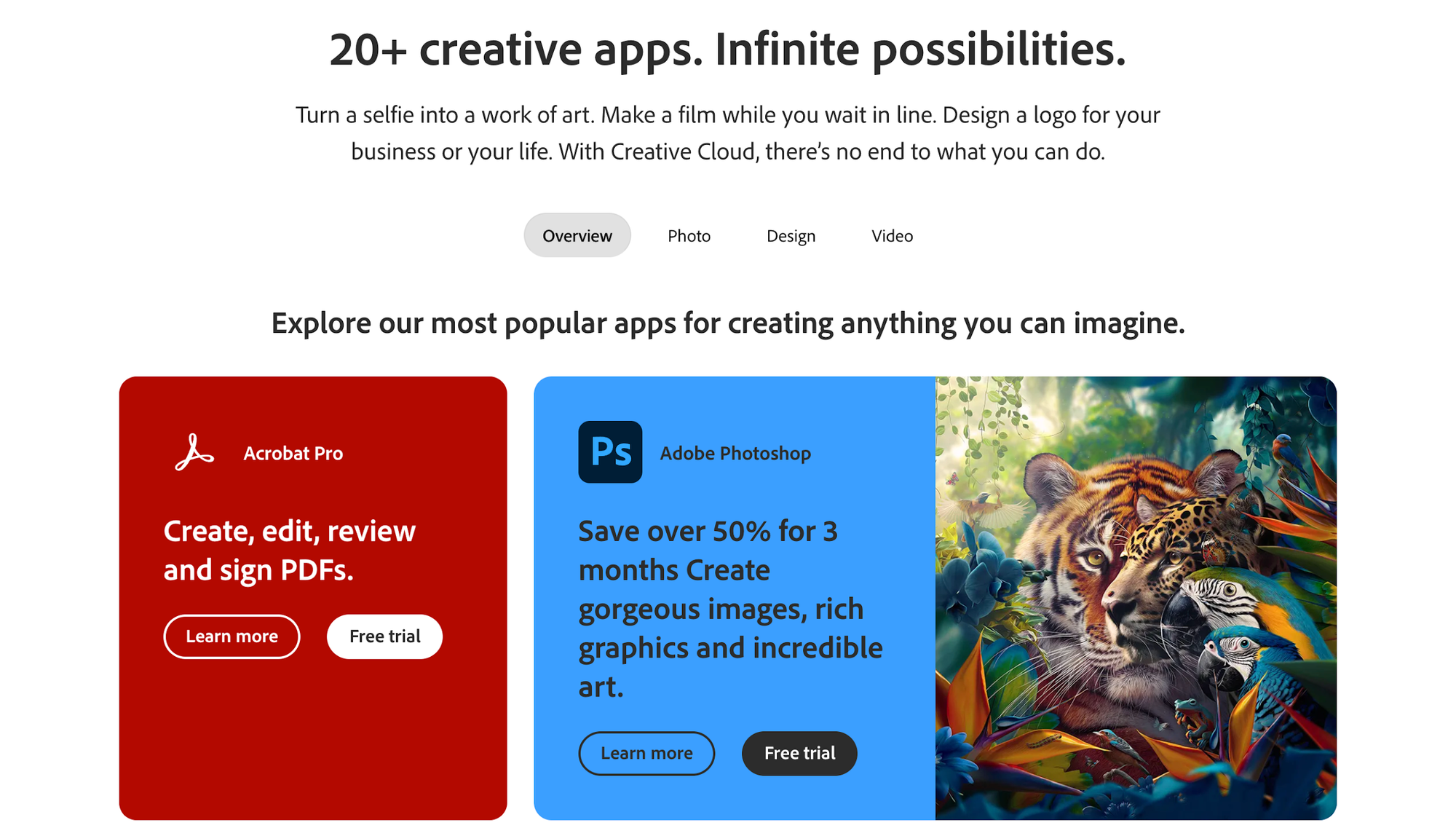
If you're looking for a suite of tools that can help you enhance creativity, streamline projects and work collaboratively, Adobe Creative Cloud ticks the boxes.
Suitable for the more advanced user — compared to Canva — Creative Cloud gives you access to a whole suite of tools such as Photoshop, Illustrator and Premiere Pro. For any small business, software like this has a learning curve, but once you get the hang of things you'll never look back.
Looking for new ways to learn these types of tools? Why not check out one of the many Whop communities?
Pros of Adobe Creative Cloud
- Creative apps — With 20+ creative apps, Adobe Creative Cloud has endless possibilities for your projects
- Sign documents — With Acrobat Pro you can create, edit, review and sign PDFs easily
- Cloud storage — Keep your projects safe with 100GB of cloud storage
Cons of Adobe Creative Cloud
- Compared to other options, it can be quite expensive
- For businesses, you can choose between a single app or all apps only
Pricing
- Single App: $37.99/month/per license
- All Apps: $89.99/month/per license
🥉 Snappa
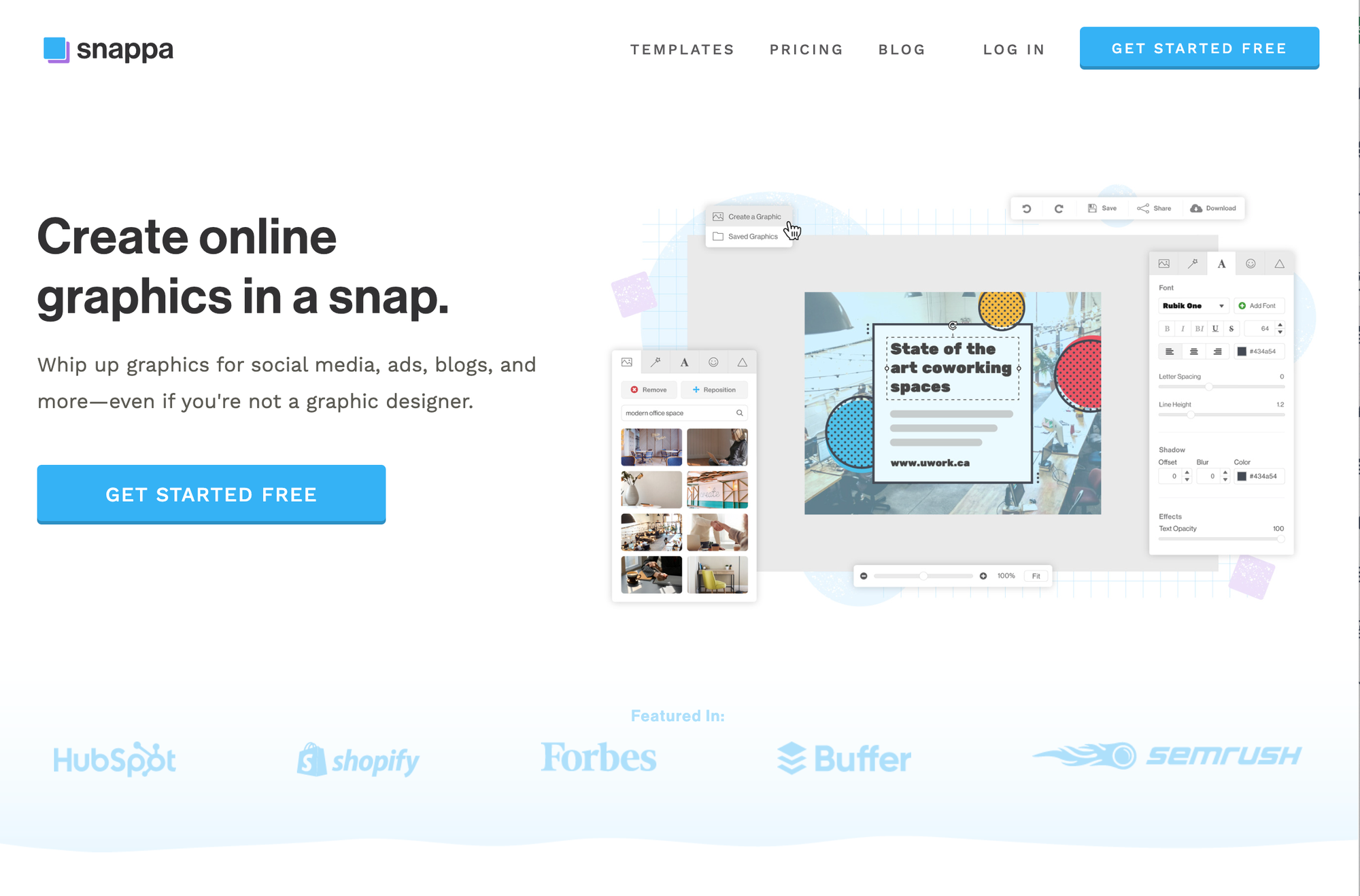
If you're looking for software that makes graphic design simple, then Snappa may be the tool for you. Snappa is a cloud-based graphic design tool. It's designed to be quick and easy to use, assisting you to create graphics for social media, blogs, email marketing, ads, and more. It's a good option for anyone looking to easily create graphics without having to hire a designer.
Some features include:
- Custom font uploads (paid)
- Unlimited downloads each month (paid)
- Over 5,000,000 HD photos and graphics
- Over 6,000 templates to use
Pros of Snappa
- Social media — With Buffer/Social Media integrations, Snappa makes it easy to create content and share it across your favorite channel
- Affordable — For small businesses looking for the best software, Snappa is reasonably priced
- Custom image dimensions — Create graphics for everything with custom image dimensions as well as popular presets
Cons of Snappa
- You cannot remove image backgrounds on the free version
- No social media integrations on their free plan
Pricing
- Free
- Pro: $15/month (1 user)
- Team: $30/month (5 users)
Best online payment option for small businesses
🥇 SumUp
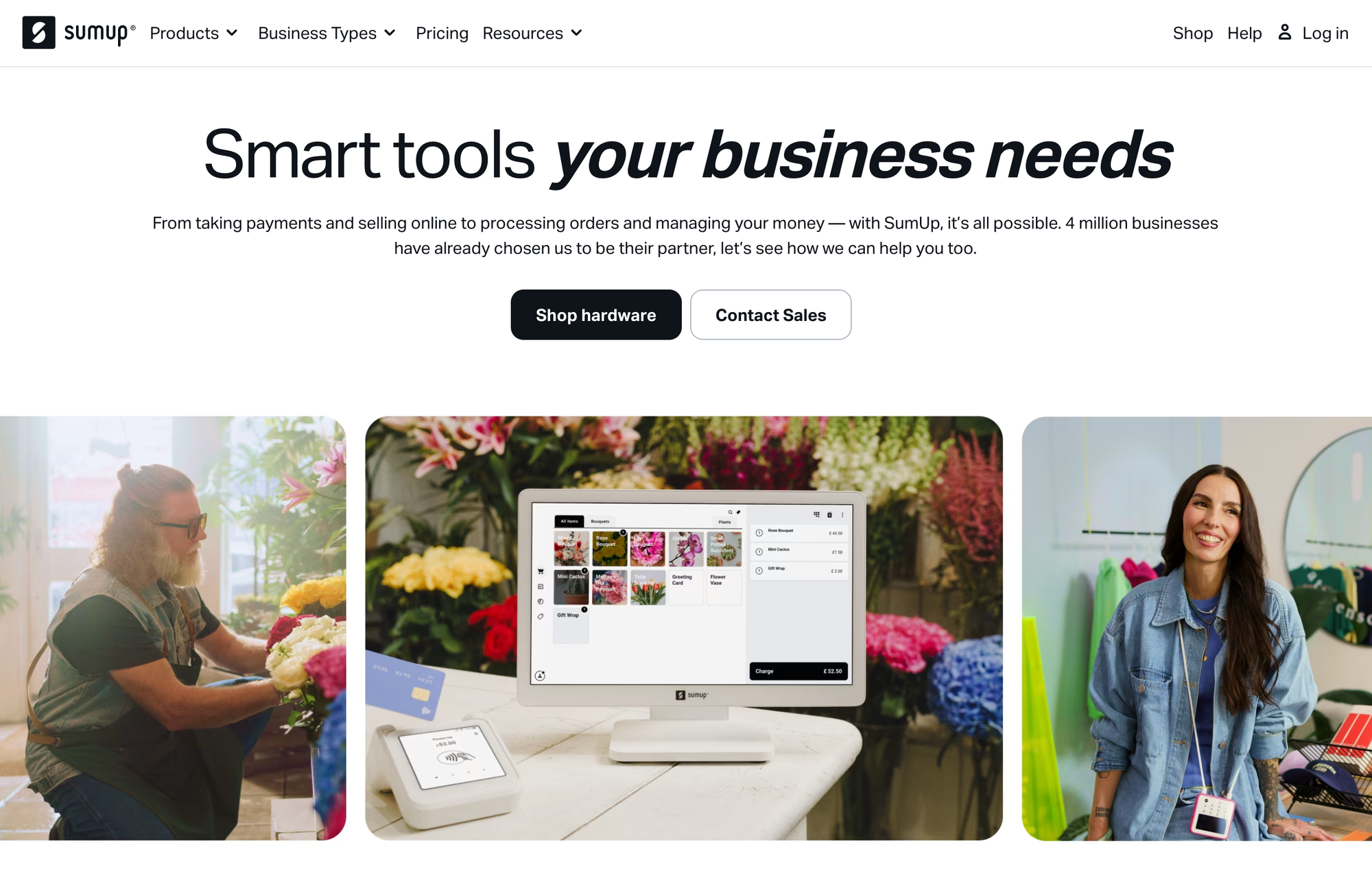
SumUp provides some of the best software for small businesses, for easy payment processing and seamless integration with a variety of tools.
Whether you're selling online or running a physical store, SumUp brings everything together for small businesses in need of a POS system.
SumUp features include:
- A wide range of accepted payment methods, including American Express, Discover and Apple Pay
- Hardware options for in-person selling, including card readers and touchscreens
- Options to connect with your favorite tools
- Ability to build your own online store without code
Pros of SumUp
- Manage your money — Easily manage your money on the go with a free business account
- Take payments your way — Accept all payments with both hardware and digital solutions
- Integrations — Connect SumUp with many different tools, including online accounting software, Zapier and more
Cons of SumUp
- Some features are limited for fast-growing businesses, such as in-depth reporting
- Fewer hardware options than some alternatives if you're selling in-person
- Fees can get expensive
Pricing
- In-person fees: 2.6% + 10¢
- Online and manually entered: 3.5% + 15¢
- SumUp invoicing: 2.9% + 15¢
- POS with Connect Lite: $99/month
- POS with Connect Plus: $199/month
- POS With Connect Pro: $289/month
🥈 Square
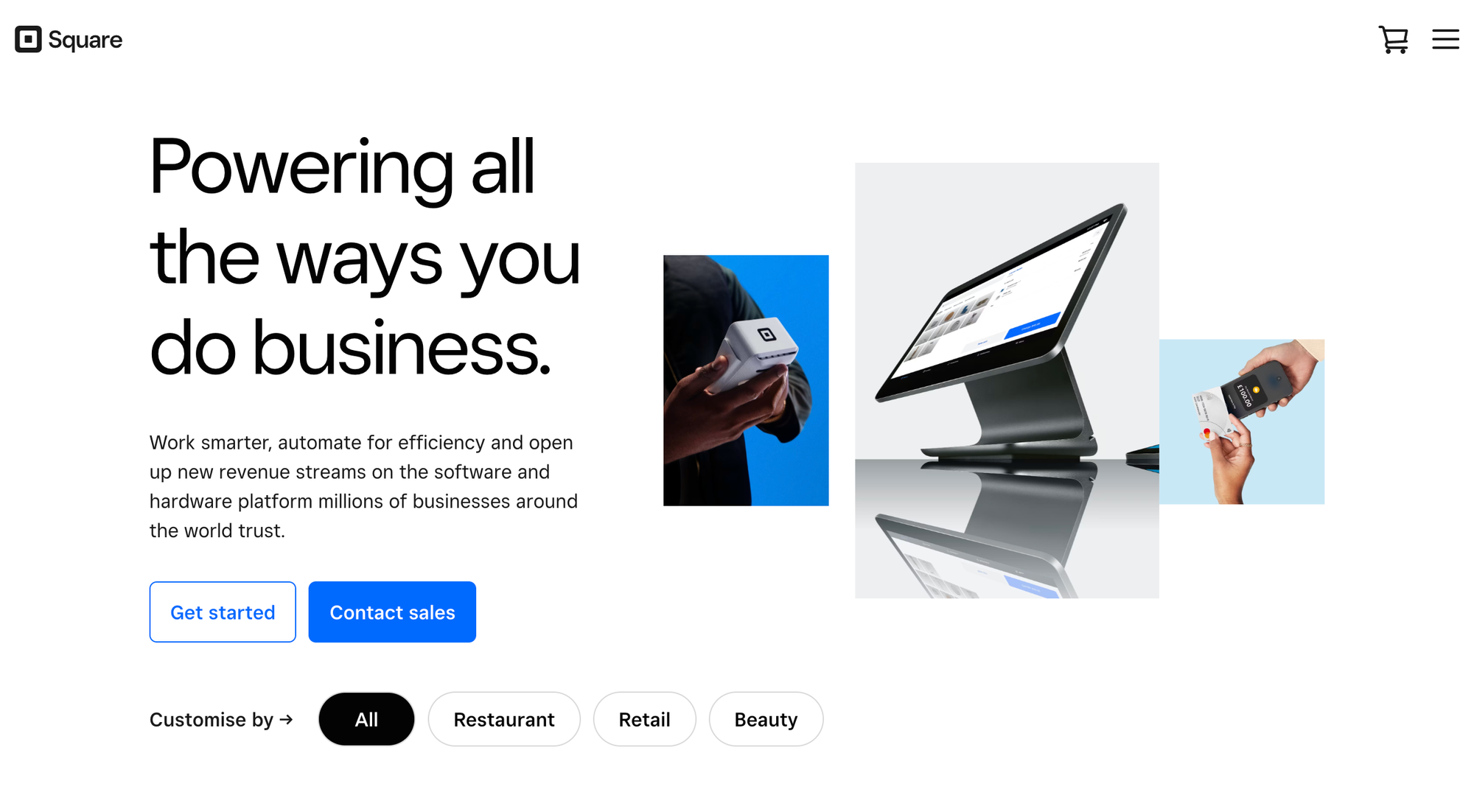
A similar payment processor to SumUp, Square also offers online payments, hardware and POS systems for small businesses. With custom product suites for restaurants, retail and beauty businesses, Square makes it easy to streamline operations across multiple locations.
Of course, you can still take online payments easily, as well as manage cash flow with instant transfers and even optimize your team's shifts.
Other Square features include:
- Centralized customer data and insights
- Square Assistant automates client communications
- Payroll options make it easy to process employee payroll and contractors
Pros of Square
- API integration — Easily connect Square using APIs to take payments, manage customers and more
- Apps — Access prebuilt app integrations in the Square App Marketplace
- Payment processing options — Accept payments both online and in-person easily
Cons of Square
- Fees can quickly rack up for small businesses with high transaction volumes
- Higher transaction fees than some alternatives
Pricing
- Free: + 2.9% + 30¢ processing fees
- Plus: $29/month + 2.9% + 30¢ processing fees
- Premium: $79/month + 2.6% + 30¢
🥉 Stripe
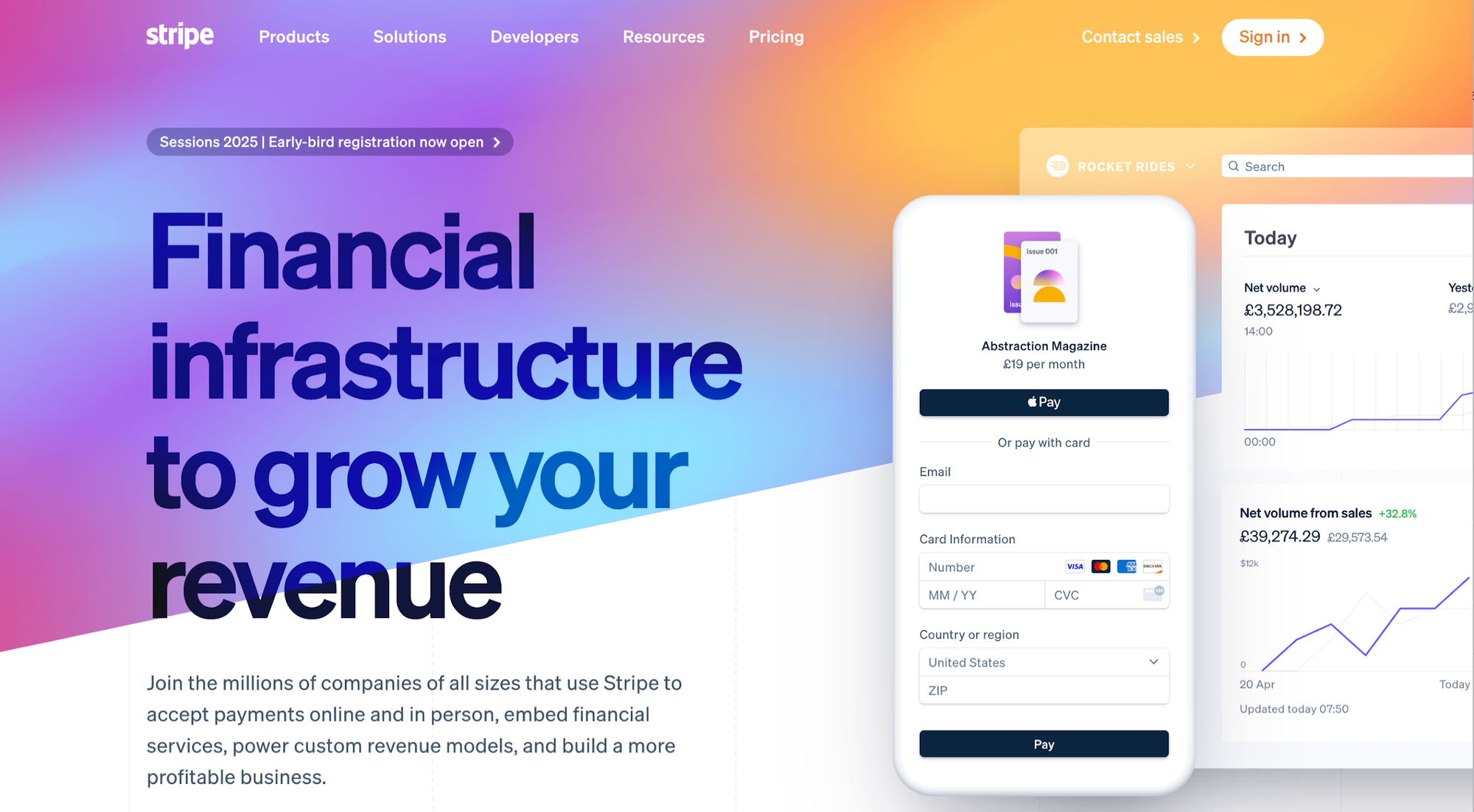
Stripe is an incredibly popular option as a payment processor, used by businesses of all sizes for online and in-person payments. As of February 2024, Stripe holds a market share of 21% of online payment processing technologies.
So, as such a huge player in the game, Stripe has a large range of features that make it a great choice for businesses. These include comprehensive payment processing, custom checkout screens, advanced fraud detection, reporting, analytics, and more. You can check out all Stripe has to offer in our Stripe review.
Still, it isn't right for everyone. Let's take a look at the pros and cons:
Pros of Stripe
- User friendly — Stripe's intuitive platform is easy to use for both merchants and consumers
- Robust security — Stripe keeps data safe with firewalls, intrusion detections and more
- Transparent pricing — Clear fee structure with no hidden costs
Cons of Stripe
- High processing fees of 2.9% + 30¢ per transaction
- Some customization and integration may require coding skills or help from a developer
- Limited merchant acceptance
Pricing
- Online card and wallet payments: 2.9% plus 30¢ per transaction, plus 1.5% for international cards and 1% for currency conversion
- In-person payments: 2.7% plus 5¢ per transaction, plus 1.5% for international cards and 1% for currency conversion
Payments made easy - Whop

Whop isn't strictly a sole payment method but certainly deserves another spot on this list.
No matter what you're selling, Whop can help you sell it —- and get paid. Our all-in-one platform can help you go from solo small business to budding brand in no time.
Whether you're looking to make money with an online community, sell access to webinars or sell digital downloads, Whop can help.
Whop allows you to accept global payments, including by card, Apple Pay, PayPal and even Crypto.
Pros of Whop
- Global payments — Accept payments from all around the world and open up your business to new customers, anywhere
- Hot support — With 24/7 web support, Whop is always on hand to help you get started or answer a question
- Sell anything — Whether you're marketing a brand new course or your latest ebook, setup takes just a matter of minutes and you'll be ready to sell literally anything
Cons of Whop
- You may not have heard of us before, but we think we're worth getting to know 😎
Pricing
- Start Selling: 3%+ payment processing fees
- Enterprise: Contact for pricing
Manage and grow your small business with Whop
From looking after your customers to taking payments and fulfilling digital orders, Whop can do it all.
Whether you're an entrepreneur at the very start of your small business journey, or a growing brand looking to scale, our all-in-one platform takes the headache out of running a business.
Whop is your CRM, payments system, communication tool and customer service software all-in-one
Sign up to Whop in just a few minutes today and start streamlining your business.



